One of the major concerns when moving to another country for retirement is the availability and cost of healthcare. I have been living in Quito, Ecuador, for the past 17 years and I have had several opportunities to utilize the healthcare system here during that time. There are some hospitals that I would not recommend, especially those that are government subsidized. However, there are other hospitals, such as Hospital Metropolitana in Quito that I would highly endorse. It is part of Humana Inc. and many of its doctors were educated in the U.S., Canada, or Europe.
During my time here I have never deemed it important to have health insurance. Excellent healthcare is readily available at incredibly low prices.
Several years ago, I broke my ankle. I went to a private clinic near my home to have it checked. They immediately took X-rays of the area to confirm the break. Since it was after hours they called in a specialist to look at the images to determine the proper course of action. The traumatologist determined that there was a fracture of the fibula and they placed me in a temporary cast. The cost of radiology exam, traumatologist, and cast was just $80. I had to return in eight days to have a permanent cast placed, which cost $75. The cast remained on for eight weeks. Once it was removed the doctor recommended I attend 20 hours of physical therapy. The cost of this was $6 per hour, coming to $120 total. Not something I found necessary to have covered by insurance.
Now, you might say that this is a rather minor affliction but what about something a little more catastrophic?
A couple of years ago I had a stroke. I went to see a neurologist. His first demand was that I have an MRI done, which cost $280. When I returned to see the doctor, he immediately admitted me to the hospital for further observation. Despite what the MRI indicated, a half-dollar sized shadow on my right frontal lobe, I had few physical manifestations. Most of my symptoms were cognitive, mainly aphasia. So that afternoon I was admitted to the private clinic where he worked. I was given a private room and my daughter was permitted to stay with me. They provided her with a bed, blankets, and pillows.
While in the hospital they ran several more tests: an EKG to check my heart, an ultrasound to check my carotid artery, and blood tests. I spent three nights for observation. I had regular visits frim my neurologist and cardiologist. The total cost for this service was less than $2,000: neurologist fee $400, cardiologist fee $300, hospital fee for three night plus all medical exams $600. Within a month, I had no outward signs that I had had a stroke. Nine months later I went ziplining to celebrate my birthday.
My experience with the Ecuadorian healthcare system has been very positive. Health insurance is readily available but I still do not find it an important option. If anyone has concerns about healthcare upon retirement, I would give Ecuador two thumbs up.

Get Your Free Ecuador Report Here:
Learn more about Ecuador and other countries in our daily postcard e-letter. Simply enter your email address below and we'll send you a FREE REPORT - Ecuador: Live Well on Your Social Security.
This special guide covers real estate, retirement and more in Ecuador and is yours free when you sign up for our postcards below.
Related Articles
Cotacachi, Ecuador: A Small Town With An International Flair
Is It Safe To Live In Cotacachi?
Upcoming Conferences
The Only 2024 Fast Track Panama Conference
If your dream retirement involves stunning beaches… lush green mountains… a warm climate with no hurricanes… first-rate healthcare… incredible value for money (a couple can live well on $2,200 a month)… and the World’s #1 Retiree Discount Program…
Join our Panama experts and expats in February and discover why Panama could be your perfect paradise.


.png)